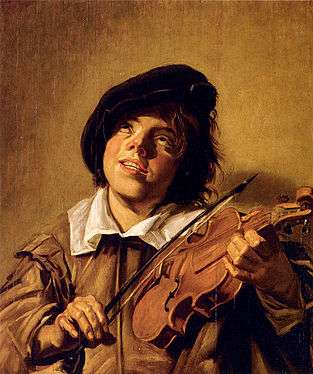Janko Muzykant

Janko Muzykant (translated into English as Janko the Musician, and less commonly as Yanko the Musician or Johnny the Musician) is a short story (also described as novella) by Polish writer and winner of 1905 Nobel Prize in Literature, Henryk Sienkiewicz. It has been described as one of his most successful works in that genre.[1]
Janko Muzykant was first published in the Kurier Warszawski in 1879.[2]
The story is representative of the positivism in Poland period in Polish literature, focusing on social injustice and the wasted life chances for peasant children.[2][3][4][5][6] Other themes include the folk beliefs and superstitions of uneducated peasantry.[7] The story focuses on the unfair treatment of a child, Janko. Janko is a peasant child, gifted by musical talent, who becomes fascinated by the fiddle he hears from a nearby noble manor. He sneaks to the manor to touch them, is captured, sentenced to flagellation, and dies from injuries suffered.[6]
The story was well received in Poland, and was translated into a number of other languages, including English, Spanish and Russian.[7][8] It was one of Sienkiewicz works cited by Carl David af Wirsén during his speech presenting Sienkiewicz with the 1905 Nobel Prize in Literature.[9] Others have praised it for transcending national prose, and being universal.[8] As early as 1957 the story has had been translated by four different English translators, and appeared in seven different editions (the earliest dating to 1884).[10] In Poland, it has been often included in the list of required school readings.[11]
In 1930 the story was made into a movie under the same name, directed by Ryszard Ordyński.[12] In 1992 it was adapted as a one-hour television special.[13]
References
- ↑ George Thomas Kurian; James D. Smith III (16 April 2010). The Encyclopedia of Christian Literature. Scarecrow Press. p. 564. ISBN 978-0-8108-7283-7. Retrieved 28 May 2013.
- 1 2 Henryk Markiewicz, Sienkiewicz Henryk Adam Aleksander Pius, Polski Słownik Biograficzny, Tome XXXVII, 1997, p.205
- ↑ "Poland in the classroom - Henryk Sienkiewicz and Quo Vadis". Info-poland.buffalo.edu. Retrieved 2013-05-28.
- ↑ Wacław Walecki (1997). A short history of Polish literature. Polish Academy of Sciences, Cracow Branch. p. 50. Retrieved 28 May 2013.
- ↑ Gale Research Company; Laurie Di Mauro (1993). Twentieth-century literary criticism. Gale Research Co. p. 157. ISBN 978-0-8103-7973-2. Retrieved 28 May 2013.
- 1 2 Leszek Kamiński; Elżbieta Ptaszyńska-Sadowska (1994). Leksykon postaci literackich: od Antygony do Zagłoby. Real Press. p. 114. ISBN 978-83-85878-57-5. Retrieved 28 May 2013.
- 1 2 Windle, Kevin (1 April 1990). "Some Slavonic Translations of Sienkiewicz's "Janko Muzykant": The Translator as Naturalist". The Modern Language Review. 85 (2): 388. doi:10.2307/3731818.
- 1 2 Walter Zebrowski (1965). "Sienkiewicz's "Janko Muzykant": Criticism and Translation". Polish American Studies. 22 (1): 17–29. doi:10.2307/20140229.
- ↑ Horst Frenz (1999). Literature: 1901-1967. World Scientific. p. 36. ISBN 978-981-02-3413-3. Retrieved 28 May 2013.
- ↑ Ordon, Edmund (1957). "THE RECEPTION OF THE POLISH SHORT STORY IN ENGLISH: REFLECTIONS ON A BIBLIOGRAPHY". The Polish Review. 2 (2/3): 125–132. doi:10.2307/25776123.
- ↑ Iwona Morawska (2005). Rola literatury w edukacji patriotycznej uczniów szkoły podstawowej (1944-1989). Wydaw. UMCS. pp. 160–161. ISBN 978-83-227-2290-9. Retrieved 28 May 2013.
- ↑ Sheila Skaff (2008). The Law of the Looking Glass: Cinema in Poland ; 1896 - 1939. Ohio University Press. p. 202. ISBN 978-0-8214-1784-3. Retrieved 27 May 2013.
- ↑ "Janko Muzykant". filmpolski.pl. Retrieved 2013-05-28.
External links
| Polish Wikisource has original text related to this article: |
- Yanko: The Musician and Other Stories, 1893 English edition, public domain full text
- (Polish) Story, public domain full text
- (Polish) E-book of a story, public domain full text